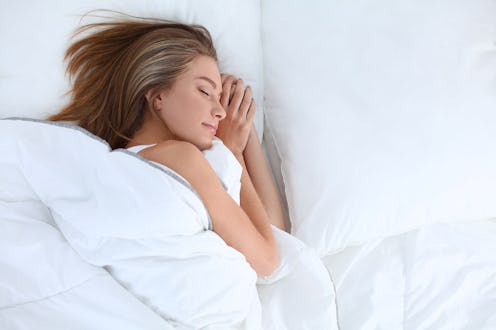
Waking up to a breakout is near the top of my list of "Worst Things Ever," right alongside "morning beauty routine" and "waking up on early mornings, in general." Not-so-conveniently, they all directly influence each other, so when one takes a nose dive, the rest follow suit. But stopping breakouts overnight and waking up to clear skin isn't as hard to accomplish as you might think. I spoke with dermatologist Dr. Kally Papantoniou about some different causes of those pesky morning bumps, getting the expert's advice on what can be done at night for better skin in the morning.
Getting your full eight hours of sleep every night (or close to it) helps significantly when it comes to a clearer complexion. Dr. Papantoniou said your skin uses that time to repair itself, so the more rest you're giving yourself, the more rejuvenated you'll look (and feel). Even the steps of your evening beauty routine could affect your spot count in the morning: Using chemical exfoliators before bed, as opposed to physical scrubbers, can be very effective when it comes to waking up pimple-free. Dr. Papantoniou says they "gently exfoliate, get that top layer off without rubbing the skin or inducing it to become thicker, which I see happening." Ahead, a few small bed time tweaks that could make all the difference for your mornings.
1. Don't Skip Your Evening Skincare Routine
VaniCream Gentle Facial Cleanser, $11, Amazon; Neutrogena Ultra Gentle Cleanser, $13, Amazon; CeraVe Hydrating Cleanser, $12, Amazon
Dr. Papantoniou's biggest word to the wise? "Don't get lazy! If you have a prescription acne medication or are using an OTC acne cream, apply it before going to bed. Do not wait until the last minute — chances are that you will be too tired to even apply it, and when you are consistent, you will always have better results," she says. Never sleep in your makeup, and be sure to incorporate a before-bed and morning cleanser that specifically targets breakouts. Especially if you experience bouts of dried-out skin, she says, "I would use a gentle cleanser, like VaniCream cleanser (which is hypoallergenic), Neutrogena Ultra Gentle Cleanser, and CeraVe Hydrating Cleanser only twice daily — and make sure to only use your hands."
2. For Dried-Out Skin, Use Overnight Humidifier & Review Your Cleansers
PureGuardian Ultrasonic Cool Mist Humidifier, $29, Amazon
"For skin that is dried out, a humidifier, like PureGuardian, can help maintain better moisture levels to the air in your bedroom and help reduce dryness to the skin," Dr. Papantoniou says. But in addition to that, if you're dealing with acne and dried-out skin, it's important to review your cleanser. Dr. Papantoniou said Neutrogena's Visibly Clear Pink Grapefruit Pink Grapefruit Cream Wash can be less drying, and that it's important to check out your moisturizer, too. "Make sure that you are moisturizing with a gentle moisturizer, such as CeraVe PM lotion, which is formulated for sensitive skin and will not increase the risk for break outs," she says.
Neutrogena Visibly Clear Pink Grapefruit Cream Wash, $18, Amazon; CeraVe PM Lotion, $8, Amazon
3. Position Yourself To Sleep On Your Back
Sharper Image Butterfly Pillow, $20, Amazon
Sleeping on your back may very well contribute to less breakouts in the morning, says Dr. Papantoniou. "When we sleep on our sides, this can increase wrinkles, and the friction can also increase the number of clogged pores on the side of the face." She advises getting a full eight hours, so your skin can heal and better repair itself as you sleep. "It is an important part of your day," she says. If you have a tendency to roll to the side or smoosh your face into your sheets, this positioning pillow might be a big help. Users say it's incredibly comfortable for back sleeping, and it helps them wake up without the usual aches and pains of craning their necks all night.
4. Sleeping On Clean Silk Pillowcases Means Less Bacteria
Oosilk Mulberry Silk Pillowcase , $20, Amazon
The general rule of thumb is to change pillowcases and sheets weekly, says Dr. Papantoniou, but two or three times a week could be necessary for oily breakout-prone skin. A dirty pillow is loaded with bacteria, oil, and sebum from skin, in addition to residue from your conditioner. "This can play a role in clogging the pores on the sides of your face and can increase the risk for flare ups and black heads," she says. Breathable pillowcases made from cotton or silk will be more forgiving to your skin, as well as less likely to harbor bacteria, says Dr. Papantoniou.
Bustle may receive a portion of sales from products purchased from this article, which was created independently from Bustle's editorial and sales departments.
Images: Fotolia (1); Amazon (8)